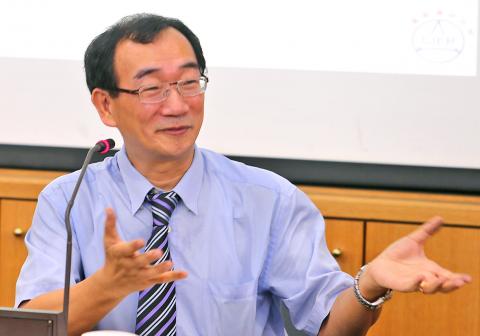The Chung-Hua Institution for Economic Research (CIER, 中華經濟研究院) yesterday cut its forecast for GDP growth for this year to 3.04 percent, down from the 3.56 percent it projected in April, as a global economic slowdown, especially in China, affects exports.
However, academics who joined the discussion challenged the institution’s new forecast, saying it would be difficult — if not impossible — for the economy to expand 3 percent this year and the government should focus its resources on improving domestic demand.
Exports, which drove more than 70 percent of GDP growth in the first quarter, are predicted to grow 3.88 percent this year, sharply down from a prior estimate of 6.26 percent growth, the CIER report showed.

Photo: CNA
“The second half may put up a weaker performance compared with the first half owing to a higher base,” CIER researcher Peng Su-ling (彭素玲) told a media briefing.
GDP growth likely reached 3.11 percent in the first half of the year, but could decelerate to 2.97 percent for the rest of the year, with major economies proving to be weaker than expected, Peng said.
Slowing global growth is unfavorable to Taiwanese exports, which contracted 7.1 percent in the first half, the report said.
Taiwanese exports to major trading partners, notably China and Southeast Asian nations, are declining, while South Korea is gaining market share, the report said.
The trend suggests declining competitiveness among local exporters, Peng said.
To make things worse, China is reducing its dependence on imports of electronic components from Taiwan, as it builds up its own supply chain as part of its economic restructuring, Peng said.
On the currency front, the New Taiwan dollar has risen 2.67 percent versus the US dollar so far this year, while the yen and the won have retreated 1.89 percent and 1.5 percent respectively over the same period, Peng said.
A strong NT dollar is eroding exporters’ bottom lines, he said.
Government agencies are looking for ways to boost the nation’s exports and the economy as a whole, with some academics suggesting establishing a sovereign wealth fund to help finance social welfare spending and others calling for the establishment of a more investment-friendly environment.
Bills Finance Association (票券公會) chairman Hermann Wu (吳正慶) said that he and his peers doubt the economy can grow by 3 percent this year.
National Central University economics professor Chiou Jiunn-rong (邱俊榮) suggested that the government focus its efforts on strengthening domestic demand to support economic growth.
However, he added that the government gives too much importance to GDP figures.
“GDP growth may not improve or reflect the well-being of the public the way a wage increase does,” Chiou said.

TRAGEDY STRIKES TAIPEI: The suspect died after falling off a building after he threw smoke grenades into Taipei Main Station and went on a killing spree in Zhongshan A 27-year-old suspect allegedly threw smoke grenades in Taipei Main Station and then proceeded to Zhongshan MRT Station in a random killing spree that resulted in the death of the suspect and two other civilians, and seven injured, including one in critical condition, as of press time last night. The suspect, identified as a man surnamed Chang Wen (張文), allegedly began the attack at Taipei Main Station, the Taipei Fire Department said, adding that it received a report at 5:24pm that smoke grenades had been thrown in the station. One man in his 50s was rushed to hospital after a cardiac arrest

SAFETY FIRST: Double the number of police were deployed at the Taipei Marathon, while other cities released plans to bolster public event safety Authorities across Taiwan have stepped up security measures ahead of Christmas and New Year events, following a knife and smoke bomb attack in Taipei on Friday that left four people dead and 11 injured. In a bid to prevent potential copycat incidents, police deployments have been expanded for large gatherings, transport hubs, and other crowded public spaces, according to official statements from police and city authorities. Taipei Mayor Chiang Wan-an (蔣萬安) said the city has “comprehensively raised security readiness” in crowded areas, increased police deployments with armed officers, and intensified patrols during weekends and nighttime hours. For large-scale events, security checkpoints and explosives

A car bomb killed a senior Russian general in southern Moscow yesterday morning, the latest high-profile army figure to be blown up in a blast that came just hours after Russian and Ukrainian delegates held separate talks in Miami on a plan to end the war. Kyiv has not commented on the incident, but Russian investigators said they were probing whether the blast was “linked” to “Ukrainian special forces.” The attack was similar to other assassinations of generals and pro-war figures that have either been claimed, or are widely believed to have been orchestrated, by Ukraine. Russian Lieutenant General Fanil Sarvarov, 56, head

PUBLIC SAFETY: The premier said that security would be tightened in transport hubs, while President Lai commended the public for their bravery The government is to deploy more police, including rapid response units, in crowded public areas to ensure a swift response to any threats, President William Lai (賴清德) said yesterday after a knife attack killed three people and injured 11 in Taipei the previous day. Lai made the remarks following a briefing by the National Police Agency on the progress of the investigation, saying that the attack underscored the importance of cooperation in public security between the central and local governments. The attack unfolded in the early evening on Friday around Taipei Main Station’s M7 exit and later near the Taipei MRT’s Zhongshan